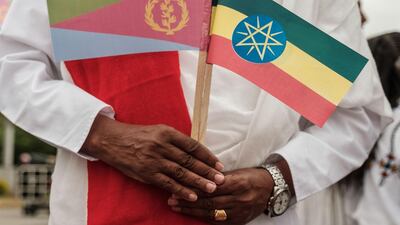The United Nations Security Council has unanimously agreed to lift sanctions placed on Eritrea following an improvement in relations with its neighbours in the Horn of Africa.
A vote on Wednesday on a British-drafted resolution lifted the arms embargo, asset freeze and travel ban which had been placed on the country in 2009 after accusations emerged that it was supporting armed groups in Somalia.
Eritrea denied the accusations and has fought the sanctions.
The UAE Ministry of Foreign Affairs and International Cooperation said the move would promote a historic reconciliation in the Horn of Africa.
A 180-degree tilt in the relationship between the capital Asmara and its neighbours paved the way for the sanctions' removal, Ahmed Soliman, a research fellow at Chatham House's Africa Programme told The National.
"The regional picture is improving," Mr Soliman said. "There is consensus being developed and the governments are wanting to work together towards political and economic integration."
Today's political landscape is different to what it was when the sanctions were first imposed.
"There has been a 180-degree tilt," said Mr Soliman. "The environment in which the actors were engaging has changed, which ultimately signals the fact that it's time for those sanctions to be removed."
In July Eritrea made peace with Ethiopia – a long-time rival it had been at war with for more than twenty years – partially facilitated by the UAE, leading to the reopening of embassies, border crossings and communications.
Following the detente, Ethiopia's revolutionary Prime Minister Abiy Ahmed lobbied UN Secretary General Antonio Guterres to remove the sanctions and a Security Council statement in November 2017 said a peaceful resolution to the border dispute would be a factor in a review of the sanctions.
________________
Read more:
Ethiopia prime minister's reformist government purges old guard in corruption crackdown
Opinion: Hopes for a peaceful Somalia could be dashed by careless leadership
DP World launches $442m port expansion in Somaliland
________________
A decade-long dispute with Djibouti is in the process of being resolved and relations have improved with Somalia's government. Both developments have been welcomed by the UN monitoring group for Somalia and Eritrea.
"Early signals coming out from New York are positive indeed," Eritrea's Minister of Information, Yemane Gebremeskel, tweeted earlier this month.
The resolution urges for continued progress on relations between Djibouti and Eritrea, asking the secretary general to report back on progress every six months.
In September, Djibouti and Eritrea agreed to work towards normalising ties and settling the decade-old border dispute.
Clashes broke out between the two countries in 2008 after Djibouti accused Asmara of moving troops across the border.
UN officials, speaking to the Associated Press anonymously, said Djibouti is unhappy about the sanctions as their dispute is not fully resolved.
Arms embargoes will continue to remain on Somalia until November 2019, including a ban on the import and export of the country's charcoal, a key source of income for Al Shabab fighters.
The monitoring groups have also indicated there hasn't been evidence of Eritrea facilitating the flow of weapons to Somalia for a long time, but this does not mean Eritrea is a reformed state, Mr Soliman says.

